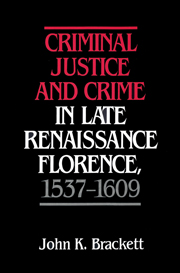Book contents
- Frontmatter
- Contents
- Acknowledgments
- Introduction
- 1 The bureaucratic structure of the Otto: the personnel and their functions
- 2 Financing the Otto
- 3 The Otto as police: organization and function
- 4 Criminal procedure before the Otto: from discovery to sentencing
- 5 The Otto and its role in the centralization of criminal justice in the Florentine state
- 6 Crime and criminals
- Conclusion
- Appendix 1 Names of other officers of the Otto di Guardia e Balìa, 1537–1609, as we have them
- Appendix 2 Budget totals by year
- Appendix 3 Comparison of detailed average expenditures for budgets, 1537–1547 and 1598–1609
- Appendix 4 Occupation key
- Bibliography
- Index
6 - Crime and criminals
Published online by Cambridge University Press: 05 September 2009
- Frontmatter
- Contents
- Acknowledgments
- Introduction
- 1 The bureaucratic structure of the Otto: the personnel and their functions
- 2 Financing the Otto
- 3 The Otto as police: organization and function
- 4 Criminal procedure before the Otto: from discovery to sentencing
- 5 The Otto and its role in the centralization of criminal justice in the Florentine state
- 6 Crime and criminals
- Conclusion
- Appendix 1 Names of other officers of the Otto di Guardia e Balìa, 1537–1609, as we have them
- Appendix 2 Budget totals by year
- Appendix 3 Comparison of detailed average expenditures for budgets, 1537–1547 and 1598–1609
- Appendix 4 Occupation key
- Bibliography
- Index
Summary
Although the Eight was far from being uniformly effective as an instrument of social control, few areas of human activity were immune from the scrutiny of its magistrates. The grand dukes inherited a large corpus of criminal legislation from the Republic; they revised some regulations, canceled others, and added new ones. The princes made law through proclamations, a power that did not derive from Roman or customary law. Here was a significant change ushered in with the ducal period. The grand dukes often made use of magistracies, such as the Magistrato Supremo, the Pratica Segreta, and the Eight itself, to serve as funnels for laws supposedly issued on their authority. At other times the grand dukes acted more openly, decreeing new legislation without even the pretense of consultation with other state agencies. But, these actions were not taken arbitrarily: The princes acted, so they stated, to foster order and social tranquillity.
But, to what degree was the sum of this criminal legislation also an expression of society's norms? The Medici and their advisers did not write laws in a vacuum, isolated from their society. Thus, in the Florentine case, a simple model of repression does not help us to understand the making of law or the perception of violators. Many laws clearly did reflect the community's will. Most Tuscans could agree, for example, that assassination was a heinous crime and would have condoned the methods used by the Otto in the investigation and punishment of that crime.
- Type
- Chapter
- Information
- Publisher: Cambridge University PressPrint publication year: 1992



